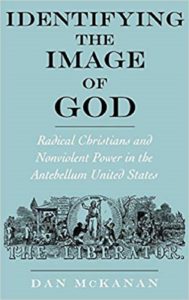 Radical Christians and Nonviolent Power in the Antebellum United States
Radical Christians and Nonviolent Power in the Antebellum United States
Identifying the Image of God, by Dan McKanan, traces the development of a theology of nonviolence in the popular literature of antebellum social reform movements. Between 1820 and 1860, American social reformers pioneered a “politics of identification” that was deeply rooted in liberal Christian theology. Activists like William Lloyd Garrison and Frederick Douglass, along with sentimental authors like Catharine Sedgwick and Harriet Beecher Stowe, drew on the doctrine of the imago dei, or image of God, to argue that God is present both in the victims of violence and in those who use nonviolent means to overcome oppression. Proponents of the new theology can be characterized as “radical Christian liberals.” McKanan explores these roots through the literature of social reform, focusing on sentimental novels, temperance tales, and slave narratives, and invites contemporary activists to revive the “politics of identification.”
Reviews and endorsements of the publication include:
“Identifying the Image of God is extraordinarily persuasive in arguing that the imago dei was crucial to the sentimental structure of feeling.”—American Literature
“McKanan excavates a radical liberal Christian theology beneath antebellum reform…presents a convincing case that such antebellum reformers as William Lloyd Garrison, Henry Clarke Wright, and Adin Ballou embraced a radical liberal Christian theology.”—American Historical Review
For more information on the publication, click here.
Fellow travelers are scholars, activists, and practitioners that embody the ideals and commitments of the Project on Lived Theology. We admire their work and are grateful to be walking alongside them in the development and dissemination of Lived Theology
